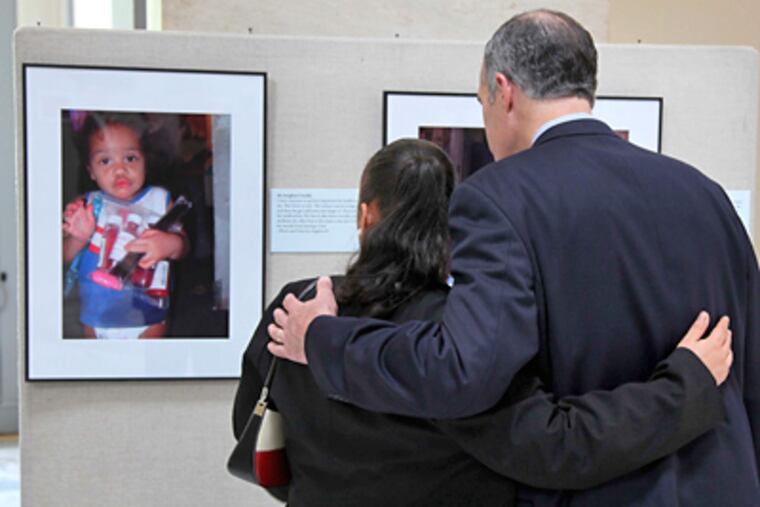Philadelphia poverty rivets D.C. eyes
"Witnesses to Hunger" women take their photos to Capitol Hill.

WASHINGTON - On a bus trip that was part field trip, part mission, 21 poor and working-poor women from North Philadelphia rode to the Capitol yesterday to tell the country about the rough life above Spring Garden Street.
In the fall, Drexel University's School of Public Health gave the women, along with 21 others, cameras to chronicle their lives and hard times in a project known as "Witnesses to Hunger." Since The Inquirer published an article about them in November, the women and their photos have been featured in newspapers and on Web sites in Japan, the Middle East, and Europe.
Yesterday, the women - trailed by a New York documentary crew and reporters from a Paris newspaper and CBS News - traveled south to see their photos displayed in the soaring rotunda of the Russell Senate Office Building, steps away from the powerful people who make laws about poverty, childhood nutrition, and health care.
Dressed in used "professional women's" clothing donated by a nonprofit and proffering business cards - though many are jobless and two are homeless - the newly empowered "Witnesses" women cried when they saw their photos in the rotunda, their voices bouncing and echoing off the clean, white marble.
"It's overwhelming, it's moving, it's touching," said Tianna Gaines, 29, standing beside her photo of her son lying with tubes in his mouth in a hospital bed. "I know somebody will walk through here and realize there are people suffering in this world."
Other photos depicted smiling babies, falling-down apartments, asthma nebulizers, unstocked refrigerators, and a sidewalk made bloody by a shooting.
At turns hopeful and desolate, the "Witnesses" photos are the view of women with blunt and unvarnished visions of life.
"The American people have no concept of the type of poverty these women experience," said Mariana Chilton, a Drexel public-health professor and anthropologist who conceived the project. "These photographs open a door to give people a sense of what it's like to be in the kitchens of some of these women, who've been mistreated by the welfare system and fight chaos every day."
The exhibit, which opened Monday and closes tomorrow, was paid for by Chilton's office through donations and was sponsored by Sen. Robert P. Casey Jr. (D., Pa.). "I'm deeply grateful to these women for opening their lives to be documented and exhibited to the people in Washington and beyond," Casey said.
Sen. Arlen Specter (D., Pa.) joined Casey in praising the women, saying the photos were "especially effective in telling people what is going on."
Emotional and awed, the women were giddy on the bus ride down, listening to Beyoncé and marveling at the turn of events that has made them the object of so much attention.
"I'm floored, shocked, and amazed at all this," said Erica Smalley, 24. "This project is helping me not be negative about my life, though I have to say I still get depressed."
Chilton said "Witnesses" had turned isolated, impoverished women into a growing sisterhood with a camaraderie none had ever experienced.
"Remember, ladies," Chilton told the women as the bus motored toward the Capitol complex, "enjoy yourselves. This is all about you and your power."
Before entering the Senate building's three-story rotunda, the women changed from their street clothes into the donated ensembles. The transformation that the outfits created was quickly evident, as though the dark suits and dresses enhanced self-esteem.
"You all look good," said Ashley Ortiz, 24. In November, she had declared that the world needs "bottom feeders. . . . Who do you get to step on if not me?"
She sounded different yesterday in a black outfit with sunglasses and white pearls, reminding more than one observer of a Latina Jackie Kennedy.
"I feel good in these clothes," she said. "Doesn't it make you feel good?"
She and the other women enjoyed explaining to tourists what they were thinking when they were taking their photos in North Philadelphia. And women who had been invisible their whole lives took special relish in pulling out their business cards and exchanging them with Capitol Hill staffers, like sharp lobbyists practicing the art of persuasion.
At one point, Joanna Cruz, 24, broke down when she saw a photo of the dilapidated kitchen she once had. She now lives in a better place she got with Chilton's help.
A woman who wanted anonymity took a long time explaining to Casey a photo of bruises on her body made by a boyfriend she thought would kill her. After staring a long time at the stark photo, Casey hugged her.
As the Witnesses were about to leave the rotunda, a group of 11th and 12th graders from Uniontown, Pa., near Pittsburgh, began studying the photos and speaking with the women. The young people, part of a Christian organization known as Church Communities International, spontaneously gathered with their pastor, Paul Winter, facing the women. They began singing "If I Had a Hammer" and "This Little Light of Mine" to the women as a gesture of good will.
"It's part of our joy," Winter said.
Many of the women teared up, then cheered the students.
At the end of the day, the clearly buoyed women felt as though they had made the right impression with legislators. But they knew that North Philly and its endless problems were waiting at the end of the bus ride home.
"I've got to go back now and see my boys' faces," said Angela Sutton, 33. "I'll have to tell them the fight isn't finished. But we made a start."
For a video of the women and their photos: